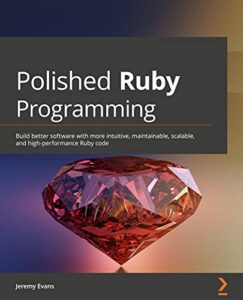Q: What is/are your specialist tech area(s)?
Jeremy: I focus on Ruby programming, SQL databases, web development, authentication systems, and OpenBSD system administration.
Q: How did you become an author for Packt? Tell us about your journey. What was your motivation for writing this book?
Jeremy: Packt emailed and asked if I was interested in writing a book on Ruby programming. I hadn’t considered doing so before, but I had more spare time than usual due to the pandemic, so I said yes.
Q: What kind of research did you do, and how long did you spend researching before beginning the book?
Jeremy: Thankfully, the book didn’t require significant research. It is mostly relating the principles of Ruby programming that I’ve learned over the last 16 years as a Ruby programmer.
Q: Did you face any challenges during the writing process? How did you overcome them?
Jeremy: I didn’t face any significant challenges during the writing process.
Q: What’s your take on the technologies discussed in the book? Where do you see these technologies heading in the future?
Jeremy: I expect Ruby to continue to be a relevant language for the foreseeable future.
Q: Why should readers choose this book over others already on the market? How would you differentiate your book from its competition?
Jeremy: Polished Ruby Programming is for programmers that already know how to program in Ruby, but are still learning how to design systems and why a particular design approach is better than alternatives.
Q: What are the key takeaways you want readers to come away from the book with?
Jeremy: Hopefully, after readers have finished reading Polished Ruby Programming, the principles it teaches will help them develop simpler, more optimized, and more robust libraries and applications.
Q: What advice would you give to readers learning tech? Do you have any top tips?
Jeremy: The best advice I can give to people starting to learn programming is, to focus on writing programs that you personally need, as I think that is the best way to learn.
Q: Do you have a blog that readers can follow?
Jeremy: I don’t have a blog. I think it’s more valuable to the community and more personally fulfilling to spend time fixing bugs than writing blog posts.
Q: Can you share any blogs, websites and forums to help readers gain a holistic view of the tech they are learning?
Jeremy: If you are interested in Ruby programming, one of the best places to learn is to follow the Ruby language commit log and the ruby-core mailing list.
Q. What is that one writing tip that you found most crucial and would like to share with aspiring authors?
Jeremy: Error on the side of writing too much material. Rely on your technical reviewers to let you know which sections may not be adding as much value, and cut those sections.
Q. How would you describe your author journey with Packt? Would you recommend Packt to aspiring authors?
Jeremy: Working with Packt has been fairly straightforward, and the Packt staff are very professional. It does take some adjustment to write in Packt style instead of a style I find more natural, though.
Q. Do you belong to any tech community groups?
Jeremy: I’m one of the current organizers of SacRuby, the Sacramento Ruby Meetup. However, we haven’t been active since the start of the pandemic.
Q. What are your favorite tech journals? How do you keep yourself up to date on tech?
Jeremy: I follow the Ruby commit log and the ruby-core mailing list. I also read the ruby subreddit and RubyFlow on a regular basis.
Q. How did you organize, plan, and prioritize your work and write the book?
Jeremy: Part of getting a Packt book approved is writing a detailed outline. I basically just follow the outline I wrote, and and try to explain the points using a lot of Ruby code examples.
You can find Jeremy’s books on Amazon by clicking on the cover image:









